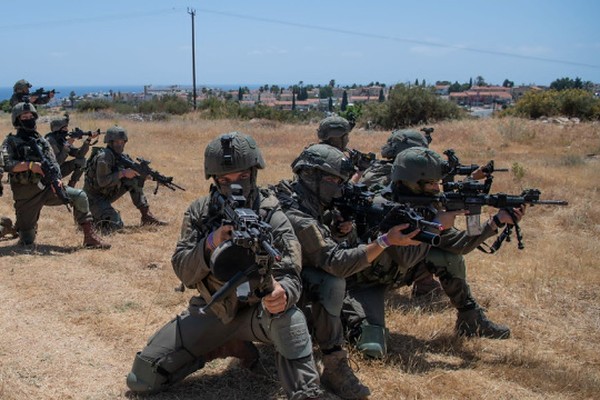Both the Trump and Biden administrations have recognized Cyprus’s growing strategic importance.
By Ahnaf Kalam, Middle East Forum
As tensions flare between Israel and Hezbollah, the Pentagon dispatched several dozen troops to Cyprus to help with the evacuation of American citizens from the Levant should the conflict escalate.
Preparing for Noncombatant Evacuation Operations is standard procedure whenever conflicts erupt. Cyprus has historically served as a refuge during conflicts, such as during the 2006 war between Israel and Hezbollah.
The U.S. deployment to Cyprus could do more. While Cyprus remains outside of NATO due to Turkey’s de facto veto and occupation of the northern third of the island, the United States could do more bilaterally to leverage Cyprus’s strategic location to reinforce its military posture and deter Iranian influence.
The United States is already quietly augmenting its forces in the region. The USS Harry S. Truman is on its way to the Mediterranean and Red Sea to replace the USS Eisenhower that returned from the region two months ago.
The USS Wasp Amphibious Ready Group, replete with F-35 Joint Strike Fighters, remains in the Eastern Mediterranean after a port visit to Limassol, Cyprus, last month.
The United Kingdom, meanwhile, maintains permanent bases at Akrotiri and Dhekelia, both sovereign British territory by treaty. British Prime Minister Keir Starmer announced that he would augment the British contingent with 700 troops, ostensibly to assist with evacuations.
On September 25, Secretary of State Antony Blinken reiterated his fear that a “full-blown war” could erupt. If he seeks to prevent this outcome, the United States needs more than rhetoric.
Only a more permanent military presence, capable of striking at Iranian proxies and their offensive capabilities, can prevent war. Iran and its proxies constantly test red lines.
They push until the United States and its allies push back to show that red lines are not rhetorical but real.
Both the Trump and Biden administrations have recognized Cyprus’s growing strategic importance.
In 2020, President Donald Trump’s administration lifted a decades-old arms embargo on Cyprus, allowing the island nation to purchase American military equipment in order to rebuff threats from Russia, Iran, and Turkey.
The Trump administration also increased military cooperation with Cyprus, paving the way for joint exercises and military support that enhanced deterrence capabilities in the region.
The Biden administration has continued to deepen defense cooperation with Cyprus, expanding joint military exercises and intelligence sharing, bolstering maritime security, and seeking to help Cyprus counter Iran’s proxy networks that increasingly seek to infiltrate from the largely lawless Turkish-occupied zone.
As instability in the Middle East increases U.S. deployments, Cyprus also has played a pivotal role, including as the hub for the short-lived floating dock off Gaza.
As Cyprus steps up in partnership with the United States, the island risks targeting by reactionaries and rogues like Hezbollah or the Islamic Revolutionary Guard Corps, or, for that matter, an increasingly Islamist and irredentist Turkey.
To counter this, the United States and Europe should work to strengthen Cyprus’s own deterrence. Cyprus needs defensive weaponry, not blankets or meals-ready-to-eat.
The Pentagon, for example, might deploy advanced anti-aircraft batteries, such as the Patriot or THAAD missile defense systems. These systems would offer protection against potential Iranian missile or drone threats to both Cypriots and NATO members co-located on the island.
Additionally, the U.S. could deploy drone-jamming and anti-drone technologies to counter Turkey’s and Iran’s growing use of unmanned aerial vehicles (UAVs), including from Turkey’s new drone base in the occupied zone.
Turkey’s growing alignment with Iranian interests in the region, including its tolerance for Hezbollah activities and cooperation with Iranian militias in Syria, presents a challenge for U.S. efforts.
Schoolteachers working in the occupied zone now say half of their overcrowded classes speak only Persian or Arabic.
The U.S. Navy also should increase patrols in Cypriot waters, enhancing maritime security in the Eastern Mediterranean. This not only would deter Turkish attempts to disrupt shipping routes or Hezbollah efforts to smuggle weaponry but also would safeguard critical energy infrastructure.
Assisting Cyprus in the defense of its own waters would signal Nicosia that the United States understands the partnership is two-way.
Greater joint military exercises between Cypriot forces and their European Union and NATO counterparts would bolster interoperability and signal both Turkey and Iran that the West stands firmly behind front-line democracies.
While the United States supports Cypriot unity rhetorically, actions must supplant words.
It is essential to enhance Cypriot military capability, isolate the Turkish-occupied North, and sanction those, including airlines and shipping service companies, that do business with Turkish proxy states.
This would kill two birds with one stone, reducing malign Turkish behavior in the Eastern Mediterranean and checkmating Iranian efforts to expand into the region.





